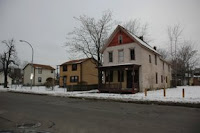 One of the most misunderstood concepts of purchasing a home is the contingency for a home inspection. Homes don't pass or fail inspection. Instead, inspectors simply document the conditions found at a home and then a buyer must decide if they can tolerate the findings of the inspection.
One of the most misunderstood concepts of purchasing a home is the contingency for a home inspection. Homes don't pass or fail inspection. Instead, inspectors simply document the conditions found at a home and then a buyer must decide if they can tolerate the findings of the inspection.In most cases, purchase contracts are written so that a buyer cannot cancel a contract based on the findings of an inspector. Instead, the buyer must first give the seller an opportunity to correct the defect and if they refuse, then the buyer may then cancel the contract.

Everybody has a different tolerance level for repairs. I've seen buyers freak-out at a dripping faucet and others that are not swayed by a roof needing replacement. Having an inspector that does a thorough inspection and can communicate clearly and calmly about findings is key to buyers making decisions that are best for them. And whether the inspection report leads to a canceled contract, neogiated repairs or simply a better night's sleep, nearly all my cliets report that the $300 or so dollars spent on their inspection was the best money spent.
I've asked inspector Adam Backus with Pillar to Post to join this blog because I like the way he works. He has agreed to provide home maintaince tips and other information of interest to individuals considering buying and selling real estate.
And should you need a home inspection, I encourage you to call on Adam. He can be reached at 585-346-9560.











